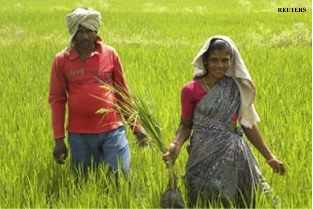Agriculture is the principal occupation to larger population of many countries and the timely communication of the information related to agriculture assumes a greater priority. For the progress of research in agriculture and agricultural sciences, the data & information should be free (as in freedom), open (interoperability) and linked. Only when the data and information is 'free & open', more innovations could be possible and more contribution from agriculture sector would be to GDP of the country. As majority of the agricultural research is public funded, research outputs (data & information) should be openly available for public good.
Highlights

London: In flood-hit fields in the Philippines, farmers are testing a hardy new variety of rice that can survive completely submerged for more than two weeks.

Despite urbanisation, agriculture remains the largest employer in many countries. But it is too often seen as an 'employment of last resort', avoided by young people, especially by those with secondary and tertiary education. Yet millions of youth remain unemployed and governments appear incapable or unwilling to formulate policies that could provide young people with employment in the fast-changing agrifood sector, bringing consequent economic and social benefits. But what could make agriculture attractive to young job-seekers?

Government of Samoa and World Bank Sign Agreements for US$13 million Agriculture Competitiveness Enhancement Project in Samoa
Africa has historically been known for its mineral wealth, which although important for economic development, has been associated with economic dynamism. However, policy attention across the continent is now shifting toward fostering agricultural innovation through enhanced research support and entrepreneurship. However, bringing these to bear on agricultural innovation will require a radical transformation of the higher education system for this sector.
Currently, the most important obstacle facing agricultural innovation is the separation that exists between research, which is carried out mostly in national research institutions, and education, which is conducted in universities. To overcome this challenge, an alternative approach is needed to facilitate the creation of a new generation of agricultural universities under the relevant line ministries. These new institutions will be guided by higher education authorities, but will be embedded in the ministries responsible for agriculture, livestock and fisheries. The seed for such universities already exists in the form of national institutes, which can be upgraded to combine research, teaching, extension and commercialisation under one roof.
For many young men and women in Nigeria, it is the dream career. Ask them where they want to work, and the answer flows forth without hesitation: the banking industry. Little wonder you can hardly hide your shock when you find a young man who actually studied banking in school but has since jettisoned that childhood ambition of becoming one of Nigeria’s top banking chiefs.
But that was exactly what Akinkuade Benson did. The young man has dumped banking, which he studied in the university, for a career in the most unlikely profession– farming! Today, Benson not only works as a farmer, he actually lives on a farm. But it’s not the typical farm where some makeshift, dingily constructed thatched hut serves as shelter for the labouring farmers. Benson lives and works in the Ondo State government-owned Caring Heart Agriculture Village situated in Ore, Ondo State.
AgreenSkills is an open programme of international mobility. It supports inventive, talented and experienced young researchers, from all disciplines and from all over the world, to develop challenging basic or targeted research projects in the fields of agriculture, environment, food and nutrition, and animal health.
AgreenSkills.eu provides general information about the programme, the schedule, all necessary documents as well as the official forms and templates. On the AgreenSkills website you will also find information about the mobility and hosting conditions.The electronic submission system adopted for proposal submission will follow shortly. The system is conceived to handle applications while ensuring transparency of procedures and traceability of the proposals.
第 80 页 共 110 页


